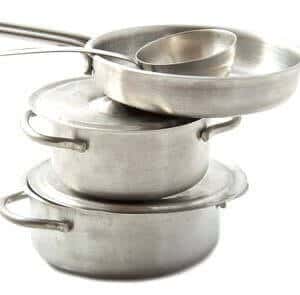
Q. You are worrying people unnecessarily about aluminum and Alzheimer’s disease. This myth was debunked years ago. Why are you still flogging a dead horse?
A. The controversy over aluminum exposure and brain toxicity has not disappeared. Recent research suggests that aluminum is linked to neurotoxicity and even dementia (Immunologic Research, online April 23, 2013).
Aluminum is found in higher concentrations in the brains of Alzheimer’s patients (Journal of Alzheimer’s Disease, online, Jan. 1, 2013). There is growing concern that aluminum is involved in the development of this devastating condition (Clinical Biochemistry, Jan. 2013). A preliminary study found that drinking silicon-rich mineral water helps remove aluminum from the body and may improve cognition (Journal of Alzheimer’s Disease, Vol. 33, # 2, 2013).
We have interviewed some of the world’s leading experts on aluminum toxicity. To learn more about this rapidly evolving topic, you may wish to listen to a CD of our one-hour show, How Safe Is Aluminum?
Aluminum is not beneficial to the body. Concerns have been raised whether the aluminum compounds used in antiperspirants might contribute to the development of breast cancer. Scientists writing in the Journal of Applied Toxicology (March 2012) offered the following observations:
- The incidence of breast cancer has increased in Western societies over the last several decades
- Aluminum is absorbed through the skin
- Aluminum concentrations in the breast area are higher relative to the rest of the body
- Long term exposure to aluminum chloride helps cells take the first steps toward becoming cancerous
These Swiss scientists conclude:
“Our observations do not formally identify aluminium as a breast carcinogen, but challenge the safety ascribed to its widespread use in underarm cosmetics.”
We acknowledge that aluminum remains controversial. But for those who prefer to avoid aluminum under their arms, we offer an alternative. Several years ago we created a roll-on deodorant based on milk of magnesia. Readers of our newspaper column told us that sloshing the familiar white laxative on their underarms was surprisingly effective, but also messy and inconvenient. There was also the preservative, sodium hypochlorite, AKA bleach.
We do not use sodium hypochlorite or parabens in our roll-on deodorant. There is a very small amount of aluminum in the natural bentonite clay that we used to stabilize the original formula. That’s why we are introducing two brand new milk of magnesia (MoM) deodorant products. They are both completely aluminum-free. One continues to be fragrance-free. The other, for women, has a delicate floral scent provided by natural essential oils.

